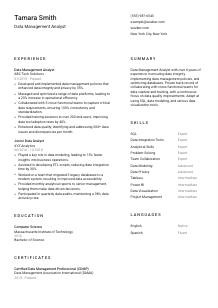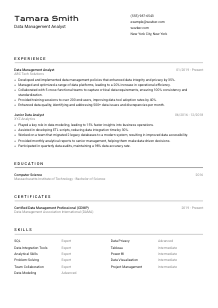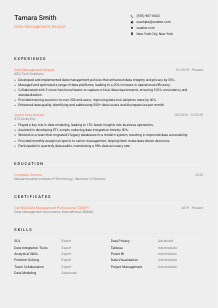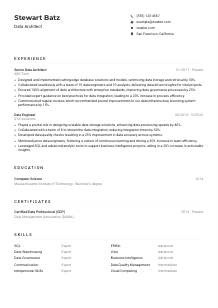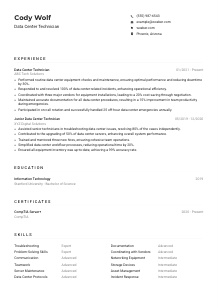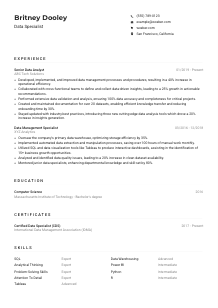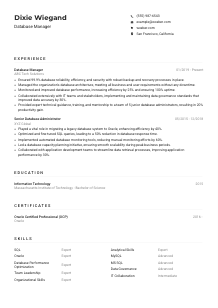Data Management Analyst Resume Example
Turning data insights into gold, but lost in the archives? Dive into this Data Management Analyst resume example, organized with Wozber free resume builder. Learn how to sync your data governance expertise with job requirements, making your career narrative as streamlined and impactful as your data strategies!
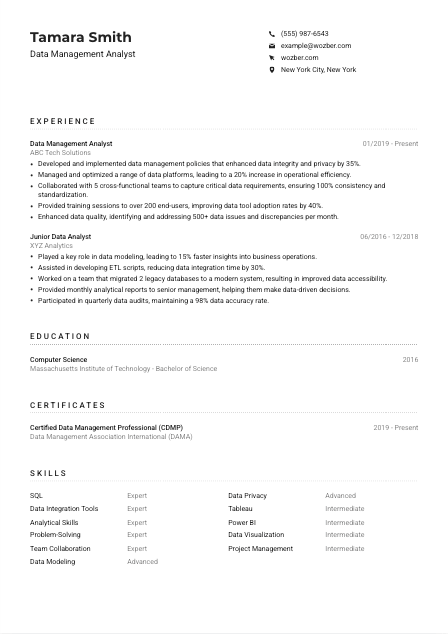
How to write a Data Management Analyst resume?
Navigating the path to becoming a standout Data Management Analyst is akin to transforming raw data into actionable insights. Your resume isn't just a piece of paper; it's a beacon of your achievements, skills, and potential. This guide, leveraging the prowess of Wozber free resume builder, aims to refine your resume into a powerful narrative that mirrors the exact needs of your targeted role. With a focus on ATS optimization and the perfect balance of content, let's create a resume that not only passes the ATS scan but also captivates the hiring manager from the first glance.
Personal Details
The journey begins with personalizing your contact information. This isn't merely about listing your details; it's about setting the stage for your professional narrative in the Data Management Analyst domain. Let's perfect this section to set a professional tone right off the bat.
1. Your Name as Your Personal Brand
Think of your name as your personal brand. It's the first thing an employer sees, so make it memorable by using a clear, professional font and setting it apart with a slightly larger size. This is about establishing your identity in the competitive field of data management.
2. The Power of a Job Title
Right beneath your name, proudly state that you are seeking the position of a "Data Management Analyst". This aligns your application with the job from the get-go, making it undeniably clear what role you're pursuing, ensuring an ATS-friendly resume format from the start.
3. Make Your Contact Details Count
Include your most reachable phone number and a professional email, ideally firstname.lastname@email.com. This demonstrates attention to detail, a key trait for any Data Management Analyst.
4. Location, Location, Location
Given the job's requirement for a candidate in "New York City, New York", make sure your location reflects this. Showing that you're in the right city not only checks a vital box but also eases any concerns about relocation.
5. A Professional Profile Worth a Thousand Words
If applicable, include a link to your professional online profile or personal website. Ensure it's polished and mirrors your resume content. A well-maintained LinkedIn profile can provide a deeper dive into your professional world, making you more accessible to potential employers.
Takeaway
This opening act is your virtual handshake. It's all about professionalism, alignment with the job, and ensuring your details are primed for an employer's glance. Remember, attention to detail here sets the tone for the detailed work you aspire to do as a Data Management Analyst.





Experience
As a burgeoning Data Management Analyst, sculpting an experience section that reflects your capacity to innovate and streamline data management processes is crucial. Let's tailor this section to demonstrate your proficiency and achievements directly tied to what your prospective employer seeks.
- Developed and implemented data management policies that enhanced data integrity and privacy by 35%.
- Managed and optimized a range of data platforms, leading to a 20% increase in operational efficiency.
- Collaborated with 5 cross‑functional teams to capture critical data requirements, ensuring 100% consistency and standardization.
- Provided training sessions to over 200 end‑users, improving data tool adoption rates by 40%.
- Enhanced data quality, identifying and addressing 500+ data issues and discrepancies per month.
- Played a key role in data modeling, leading to 15% faster insights into business operations.
- Assisted in developing ETL scripts, reducing data integration time by 30%.
- Worked on a team that migrated 2 legacy databases to a modern system, resulting in improved data accessibility.
- Provided monthly analytical reports to senior management, helping them make data‑driven decisions.
- Participated in quarterly data audits, maintaining a 98% data accuracy rate.
1. Mirror the Job's Heartbeat
Begin by dissecting the job requirements. For instance, if the job emphasizes "developing and implementing data management policies", detail similar achievements in your experience. This direct correlation will resonate well with both the ATS and the hiring manager.
2. Structuring Your Achievements
Detail your roles chronologically, highlighting your progression in the data management field. Start with your most recent role, like a "Data Management Analyst" position at ABC Tech Solutions, showing a clear timeline of your professional growth.
3. Achievement-Focused Statements
Quantify your successes wherever possible. For example, note how you "Enhanced data quality, identifying and addressing 500+ data issues and discrepancies per month." Such metrics offer tangible evidence of your contributions and capabilities.
4. The Quantifiable Impact
Numbers speak volumes. Whether you increased operational efficiency by 20% or trained over 200 end-users, providing specific figures gives your accomplishments weight and makes your application more compelling.
5. Relevance is Key
Stick strictly to the most relevant experiences for a Data Management Analyst role. This isn't the place for unrelated achievements, no matter how impressive they may be in another context.
Takeaway
Your experience section is more than a list; it's proof of your capability and potential. Approach it as a strategic narrative, meticulously aligning each accomplishment with the job's requirements. Through focused, quantifiable achievements, you'll showcase your readiness to excel as a Data Management Analyst.
Education
In the realm of Data Management Analysis, your educational background provides a critical foundation of knowledge. Aligning your education with the job's demands assures employers of your preparedness for the technical aspects of the role. Let's ensure this section substantiates your suitability.
1. Pinpoint Key Educational Criteria
Start by matching your degree directly with the job's requirements. If it asks for a "Bachelor's degree in Computer Science", ensure your degree is clearly listed. This direct match is a tick in the box for meeting the essential qualifications.
2. The Essence of Clarity
Maintain simplicity and clarity. List your degree, the educational institution, and the graduation year in a clean format. This straightforward approach allows the hiring manager to quickly confirm your educational qualifications.
3. Tailored to the Role
If your degree is a direct fit for the role, highlight it. For a Data Management Analyst position, the "Bachelor of Science in Computer Science" from the Massachusetts Institute of Technology is an ideal showcase of relevant academic preparation.
4. Coursework and Specializations
For positions that demand specific knowledge areas, it might be helpful to list relevant courses or specializations, especially for early career professionals. However, for our example, the comprehensive degree title sufficiently covers the job's educational requirements.
5. Additional Academic Achievements
Supplement your education section with any notable achievements that align with the role. This could be honors, relevant extracurricular activities, or specific projects. Remember, this is most valuable for early career positions or if the achievements directly relate to data management.
Takeaway
Your education section is a testament to your foundational knowledge and alignment with the Data Management Analyst role. By presenting your qualifications in a clear, relevant, and organized manner, you underline your preparedness and potential to contribute meaningfully in this field.
Certificates
In the rapidly evolving field of data management, certifications are gold. They're proof of your ongoing commitment to excellence and expertise. While the job description may not explicitly require certifications, presenting relevant ones can give you an edge. Let's tactfully select and present certifications that elevate your candidacy.
1. Align with Job Needs
Firstly, examine if the job hints at preferred certifications. Though our Data Management Analyst role doesn't specify, showcasing a relevant certification like the "Certified Data Management Professional (CDMP)" from the Data Management Association International (DAMA) highlights your specialized skills and commitment to your craft.
2. Selective Presentation
Quality over quantity reigns supreme. Choose certifications that directly enhance your profile for the targeted role. Highlighting the "CDMP" certification is particularly effective, underscoring your expertise in data management principles and best practices.
3. Date Transparency
Where applicable, including the date of certification showcases your up-to-date expertise. For ongoing certifications, a "2019 - Present" timeline indicates current validity and your commitment to maintaining this professional credential.
4. An Ongoing Journey
The tech landscape is perpetually in flux, making continuous learning essential. Keep your certifications updated and pursue new ones aligned with your career goals and the industry's forward march. This demonstrates your dedication to stay at the forefront of data management advancements.
Takeaway
Your certifications aren't just accolades; they're tangible evidence of your expertise and dedication to your profession. Especially in a field as dynamic as data management, they tell a compelling story of your pursuit of excellence. Highlight them proudly and let them underscore your professional narrative.
Skills
The Skills section of your resume is where you get to shine a spotlight on the professional tools and abilities you wield. For a Data Management Analyst position, this is your chance to highlight the technical and interpersonal skills that make you a standout candidate. Let's craft a skills section that dovetails neatly with the job requirements.
1. Dissecting the Job Description
Start by matching the explicit skills mentioned in the job description with your own. This includes SQL, data modeling, problem-solving, and familiarity with data visualization tools like Tableau and Power BI. This alignment ensures your resume is ATS-compliant.
2. Prioritizing Relevant Skills
List your most relevant skills, ensuring they align with the job's demands. For instance, positioning SQL and data integration tools at the top as "Expert" skills demonstrates your aptitude in areas highlighted in the job requirements.
3. A Balanced Skillset
While technical proficiencies are pivotal, don't overlook the importance of soft skills. Your ability to collaborate with cross-functional teams, shown as an "Expert" skill, matches the job's emphasis on teamwork, rounding out your profile as a well-rounded candidate.
Takeaway
Your skills section is a concise showcase of what you bring to the table. Through careful selection and prioritization, you communicate that you're not just a match for the Data Management Analyst role, but an outstanding one. Display your skills confidently, knowing they're precisely what the job demands.
Languages
In the increasingly globalized world of data management, language skills can set you apart. Whether the job requires specific language competencies or not, showcasing your linguistic capabilities can demonstrate cultural sensitivity and an ability to navigate global data landscapes. Let's position your language skills as valuable assets.
1. Linking Language to Job Requirements
Start by ensuring your resume meets explicit language requirements stated in the job posting. For our Data Management Analyst role, strong skills in "both verbal and written English" are essential. Positioning English as a "Native" language meets this primary criterion.
2. Highlighting Additional Languages
Even if not directly required, other languages you speak can add value to your application. Mentioning Spanish as "Fluent" demonstrates your capacity to engage with broader teams and data sources, potentially giving you an edge in a competitive job market.
3. Clear Proficiency Indicators
Be transparent about your language proficiency levels. Terms like "Native", "Fluent", "Intermediate", and "Basic" provide a quick, clear understanding of your linguistic capabilities, allowing employers to easily see how you fit into multilingual environments.
4. The Global Perspective
In a field where data knows no borders, additional languages might widen the scope of opportunities available to you. They signify a readiness to engage with international data sets, clients, or co-workers, making you a valuable asset in any data management team.
Takeaway
Languages are more than communication tools; they're bridges to understanding and insight in the global data management landscape. Highlight your language proficiency thoughtfully, showcasing it as yet another facet of your professional capabilities. Embrace your linguistic diversity as part of your unique value proposition in the data world.
Summary
The summary section of your resume is your professional headline, your chance to make a compelling first impression. For a Data Management Analyst, this is where you encapsulate your experience, skills, and potential in a few powerful sentences. Let's create a summary that captures the essence of your professional journey and aligns seamlessly with the job's requirements.
1. Capturing the Job's Essence
Begin by absorbing the essence of the Data Management Analyst role. Reflect on how your professional journey and achievements align with the position's demands. This awareness will be the foundation of a summary that resonates.
2. A Strong Opening
Introduce yourself with a statement that speaks to your core strengths and experience. For instance, noting that you're a "Data Management Analyst with over 4 years of experience" immediately establishes your credibility and relevance.
3. Highlighting Key Achievements
Select a few significant achievements that mirror the job requirements, like "Developing data management policies" or "Optimizing databases to support business operations." This specificity showcases your direct qualifications for the role.
4. Conciseness is Key
Your summary should be engaging and to the point. Limit it to 3-5 sentences that encapsulate your qualifications, achievements, and the unique impact you can make as a Data Management Analyst.
Takeaway
Crafted carefully, your summary becomes the elevator pitch of your professional persona. It sets the tone for your resume, enticing hiring managers to delve deeper into your accomplishments. Align it closely with the Data Management Analyst role, and make your first impression a memorable one.
Launching Your Data Management Analyst Journey
Congratulations on taking this vital step toward securing your dream job as a Data Management Analyst. Armed with these tailored insights and the support of Wozber's free resume builder, you are now well-equipped to craft a resume that not only passes ATS scans with flying colors but also captures the attention of hiring managers. Your resume is a narrative of your professional excellence. Refine it, inject your unique flair, and let it pave the way to a successful career.
The future of data management awaits your influence. Embark on your journey with confidence!

- Bachelor's degree in Computer Science, Data Management, or a related field.
- Minimum of 3 years of experience in data management or related roles.
- Demonstrated proficiency with SQL, data modeling, and data integration tools.
- Strong analytical and problem-solving skills, with a keen attention to detail.
- Familiarity with data visualization tools such as Tableau or Power BI.
- Strong skills in both verbal and written English are essential.
- Must be located in New York City, New York.
- Develop and implement data management policies and procedures to ensure data integrity and privacy.
- Manage and optimize data platforms and databases to support business operations.
- Collaborate with cross-functional teams to define and capture data requirements, ensuring consistency and standardization.
- Provide training and support to end-users on data tools and systems.
- Continuously monitor data quality, identifying and addressing any issues or discrepancies.





